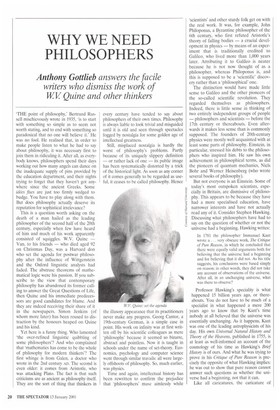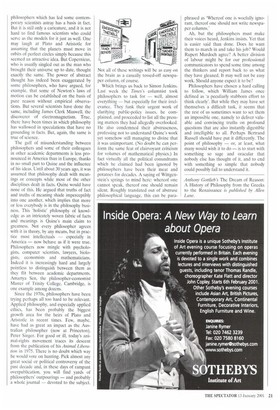WHY WE NEED
PHILOSOPHERS
Anthony Gottlieb answers the facile
writers who dismiss the work of WV Quine and other thinkers
'THE point of philosophy, Bertrand Russell mischievously wrote in 1935, 'is to start with something so simple as to seem not worth stating, and to end with something so paradoxical that no one will believe it.' He was no fool. He realised that, in order to make people listen to what he had to say about philosophy, it was necessary first to join them in ridiculing it. After all, as everybody knows, philosophers spend their days working out how many angels can dance on the inadequate supply of pins provided by the education department, and their nights trying to forget that they haven't got anywhere since the ancient Greeks. Some likes fixes are just too firmly wedged to budge. You have to play along with them. But does philosophy actually deserve its reputation for sophistical irrelevance?
This is a question worth asking on the death of a man hailed as the leading philosopher of the second half of the 20th century, especially when few have heard of him and much of his work apparently consisted of squiggles. W.V. Quine — Van, to his friends — who died aged 92 on Christmas Day, was a Harvard don who set the agenda for postwar philosophy after the influence of Wittgenstein and the Oxford linguistic analysts had faded. The abstruse theorems of mathematical logic were his passion. If you subscribe to the view that contemporary philosophy has abandoned its former calling to answer the Great Questions of Life, then Quine and his immediate predecessors are good candidates for blame. And they are indeed receiving their share of it in the newspapers. Simon Jenkins (of whom more later) has been roused to distraction by the honours heaped on Quine and his kind.
Yet here is a funny thing. Who lamented 'the over-refined linguistic quibbling of some philosophers'? And who complained that 'mathematics has come to be the whole of philosophy for modern thinkers'? The first whinge is from Galen, a doctor who wrote in the 2nd century AD. The second is even older: it comes from Aristotle, who was attacking Plato. The fact is that such criticisms are as ancient as philosophy itself. They are the sort of thing that thinkers in every century have tended to say about philosophers of their own times. Philosophy is always liable to look trivial and misguided until it is old and seen through spectacles fogged by nostalgia for some golden age of intellectual greatness.
Still, misplaced nostalgia is hardly the worst of philosophy's problems. Partly because of its uniquely slippery definition — or rather lack of one — its public image has been systematically distorted by a trick of the historical light. As soon as any corner of it comes generally to be regarded as useful, it ceases to be called philosophy. Hence the illusory appearance that its practitioners never make any progress. Georg Cantor, a 19th-century German, is a simple case in point. His work on infinity was at first written off by his scientific colleagues as mere 'philosophy' because it seemed so bizarre, abstract and pointless. Now it is taught in schools under the name of set-theory. Economics, psychology and computer science went through similar travails: all were largely offshoots of philosophy. So, much earlier, was physics.
Time and again, intellectual history has been rewritten to confirm the prejudice that 'philosophers' muse aimlessly while
'scientists' and other sturdy folk get on with the real work. It was, for example, John Philoponus, a Byzantine philosopher of the 6th century, who first refuted Aristotle's theory of falling bodies — a crucial development in physics — by means of an experiment that is traditionally credited to Galileo, who lived more than 1,000 years later. Attributing it to Galileo is neater because he is not now thought of as a philosopher, whereas Philoponus is, and this is supposed to be a 'scientific' discovery rather than a 'philosophical' one.
The distinction would have made little sense to Galileo and the other pioneers of the so-called scientific revolution. They regarded themselves as philosophers. Indeed, there is little sense in thinking of two entirely independent groups of people — philosophers and scientists — before the 17th century or thereabouts. Even afterwards it makes less sense than is commonly supposed. The founders of 20th-century physics were mostly well acquainted with at least some parts of philosophy. Einstein, in particular, stressed his debts to the philosophers who inspired him. He saw his own achievement in philosophical terms, as did the pioneers of quantum mechanics, Niels Bohr and Werner Heisenberg (who wrote several books of philosophy).
But not everyone is an Einstein. Some of today's most outspoken scientists, especially in Britain, are dismissive of philosophy. This appears to be because they have had a more specialised education, have narrower interests and have not actually read any of it. Consider Stephen Hawking. Discussing what philosophers have had to say on the question of whether or not the universe had a beginning, Hawking writes: In 1781 the philosopher Immanuel Kant wrote a ... very obscure work, The Critique of Pure Reason, in which he concluded that there were equally valid arguments both for believing that the universe had a beginning and for believing that it did not. As his title suggests, his conclusions were based simply on reason; in other words, they did not take any account of observations of the universe. After all, in an unchanging universe, what was there to observe?
Professor Hawking's speciality is what happened 15 billion years ago, or thereabouts. You do not have to be much of a specialist in what happened a mere 200 years ago to know that by Kant's time nobody at all believed that the universe was essentially unchanging. As it happens, Kant was one of the leading astrophysicists of his day. His own Universal Natural History and Theory of the Heavens, published in 1755, is at least as well-informed an account of the cosmology of his time as Hawking's Brief History is of ours. And what he was trying to prove in his Critique of Pure Reason is precisely the opposite of what Hawking implies: he was out to show that pure reason cannot answer such questions as whether the universe had a beginning, not that it can.
Like all caricatures, the caricature of philosophers which has led some contemporary scientists astray has a basis in fact. But it is still only a caricature, and it is not hard to find famous scientists who could serve as the models for it just as well. One may laugh at Plato and Aristotle for assuming that the planets must move in orbits of perfect circles simply because this seemed an attractive idea. But Copernicus, who is usually singled out as the man who brought their universe up to date, thought exactly the same. The power of abstract thought has indeed been exaggerated by some philosophers, who have argued, for example, that some of Newton's laws of motion can be established on the basis of pure reason without empirical observations. But several scientists have done the same, including James Clerk Maxwell, the discoverer of electromagnetism. True, there have been times in which philosophy has wallowed in speculations that have no grounding in facts. But, again, the same is true of science.
The gulf of misunderstanding between philosophers and some of their colleagues in other academic departments is less pronounced in America than in Europe, thanks in no small part to Quine and the influence of his ideas. Until about 30 years ago, it was assumed that philosophy dealt with meanings or concepts while most of the other disciplines dealt in facts. Quine would have none of this. He argued that truths of fact and truths of meaning shade imperceptibly into one another, which implies that more or less everybody is in the philosophy business. This 'holistic' philosophy of knowledge as an intricately woven fabric of facts and meanings is Quine's main claim to greatness. Not every philosopher agrees with it in theory, by any means, but in practice most intellectuals — especially in America — now behave as if it were true. Philosophers now mingle with psychologists, computer scientists, lawyers, biologists, economists and mathematicians. Indeed it is increasingly hard and largely pointless to distinguish between them as they flit between academic departments. Amartya Sen, the philosopher-economist Master of Trinity College, Cambridge, is one example among dozens.
Since the 1970s, philosophers have been trying perhaps all too hard to be relevant. Applied philosophy, and especially applied ethics, has been probably the biggest growth area for the heirs of Plato and Aristotle in recent times. Few, maybe, have had as great an impact as the Australian philosopher (now at Princeton), Peter Singer. For good or ill, today's animal-rights movement traces its descent from the publication of his Animal Liberation in 1975. There is no doubt which way he would vote on hunting. Pick almost any great social or political controversy of the past decade and, in these days of rampant overpublication, you will find yards of philosophers' outpourings — and probably a whole journal — devoted to the subject. Not all of these writings will be as easy on the brain as a casually tossed-off newspaper column, of course.
Which brings us back to Simon Jenkins. Last week the Times's columnist took philosophers to task for — well, almost
everything but especially for their irrelevance. They funk their urgent work of clarifying public-policy issues, he complained, and proceeded to list all the pressing matters they had allegedly overlooked. Ile also condemned their abstruseness, professing not to understand Quine's work yet somehow still managing to divine that it was unimportant. (No doubt he can perform the same feat of clairvoyant criticism for volumes of mathematical physics.) In fact virtually all the political conundrums which he claimed had been ignored by philosophers have been their meat and potatoes for decades. A saying of Wittgenstein's springs to mind here: whereof one cannot speak, thereof one should remain silent. Roughly translated out of abstruse philosophical language, this can be para
phrased as 'Whereof one is woefully ignorant, thereof (Inc should not write newspaper columns.'
Ah, but the philosophers must make their voices heard, Jenkins insists. Yet that is easier said than done. Does he want them to march in and take his job? Would Rupert Murdoch agree? A better division of labour might be for our professional communicators to spend some time among the thinkers and report back to us what they have gleaned. It may well not be easy work. Should anyone expect it to be?
Philosophers have chosen a hard calling to follow, which William James once defined as 'a peculiarly stubborn effort to think clearly'. But while they may have set themselves a difficult task, it seems that the rest of us sometimes want to set them an impossible one, namely to deliver valuable and convincing truths on profound questions that are also instantly digestible and intelligible to all. Perhaps Bertrand Russell should have put it differently. The point of philosophy — or, at least, what many would wish it to do — is to start with something so sage and oracular that nobody else has thought of it, and to end with something so simple that nobody could possibly fail to understand it.































































 Previous page
Previous page